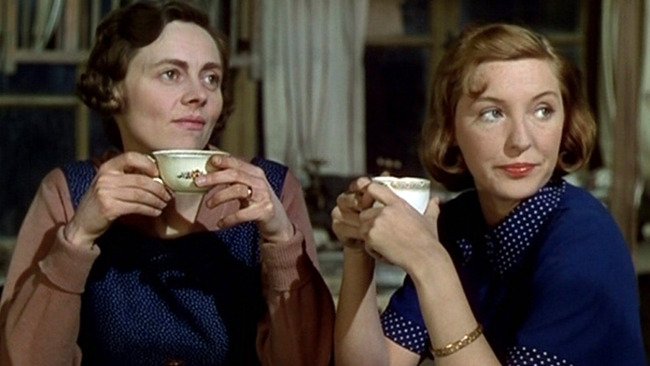 Image 1 of
Image 1 of


This Happy Breed (1944)
![]()
Country: GB
Technical: col 114m
Director: David Lean
Cast: Robert Newton, Celia Johnson, Kay Walsh, Eileen Erskine, Stanley Holloway, John Mills
Synopsis:
Life between the wars for a middle class family in a typical London street.
Review:
Following the success of In Which We Serve, Lean steered this earlier Coward play into port, and what a handsome production it was: Technicolor, a fine replica of a terraced house comprising several sets, and a career-topping performance from Robert Newton. One can cavil by pointing out that Walsh and Erskine are far too old to begin with and ought to have been doubled, or that seven adults in a two-up-two-down is stretching it a bit, with or without attic rooms; however, Coward is adept at holding a mirror up to the essence of what makes the British people themselves, or at least a certain version of themselves. He covers the key beats of two decades of British life, from the comradeship of the Great War, otherwise a taboo subject, to the epochal movements of Communism and Fascism, even spiritualism, while interweaving them with the dynamics of family life: shared space, bickering, celebration, and tragedy. In Newton's Gibbons lies what one senses to be his ideal: moderation, a stout heart, and sense of common justice; while Johnson's Ethel is all stoicism and moral duty. Thus he steeled the nation for the fight to come, reminding us of our strengths, while the Lean film was perfectly timed to boost morale for the second front.
![]()
Country: GB
Technical: col 114m
Director: David Lean
Cast: Robert Newton, Celia Johnson, Kay Walsh, Eileen Erskine, Stanley Holloway, John Mills
Synopsis:
Life between the wars for a middle class family in a typical London street.
Review:
Following the success of In Which We Serve, Lean steered this earlier Coward play into port, and what a handsome production it was: Technicolor, a fine replica of a terraced house comprising several sets, and a career-topping performance from Robert Newton. One can cavil by pointing out that Walsh and Erskine are far too old to begin with and ought to have been doubled, or that seven adults in a two-up-two-down is stretching it a bit, with or without attic rooms; however, Coward is adept at holding a mirror up to the essence of what makes the British people themselves, or at least a certain version of themselves. He covers the key beats of two decades of British life, from the comradeship of the Great War, otherwise a taboo subject, to the epochal movements of Communism and Fascism, even spiritualism, while interweaving them with the dynamics of family life: shared space, bickering, celebration, and tragedy. In Newton's Gibbons lies what one senses to be his ideal: moderation, a stout heart, and sense of common justice; while Johnson's Ethel is all stoicism and moral duty. Thus he steeled the nation for the fight to come, reminding us of our strengths, while the Lean film was perfectly timed to boost morale for the second front.
![]()
Country: GB
Technical: col 114m
Director: David Lean
Cast: Robert Newton, Celia Johnson, Kay Walsh, Eileen Erskine, Stanley Holloway, John Mills
Synopsis:
Life between the wars for a middle class family in a typical London street.
Review:
Following the success of In Which We Serve, Lean steered this earlier Coward play into port, and what a handsome production it was: Technicolor, a fine replica of a terraced house comprising several sets, and a career-topping performance from Robert Newton. One can cavil by pointing out that Walsh and Erskine are far too old to begin with and ought to have been doubled, or that seven adults in a two-up-two-down is stretching it a bit, with or without attic rooms; however, Coward is adept at holding a mirror up to the essence of what makes the British people themselves, or at least a certain version of themselves. He covers the key beats of two decades of British life, from the comradeship of the Great War, otherwise a taboo subject, to the epochal movements of Communism and Fascism, even spiritualism, while interweaving them with the dynamics of family life: shared space, bickering, celebration, and tragedy. In Newton's Gibbons lies what one senses to be his ideal: moderation, a stout heart, and sense of common justice; while Johnson's Ethel is all stoicism and moral duty. Thus he steeled the nation for the fight to come, reminding us of our strengths, while the Lean film was perfectly timed to boost morale for the second front.